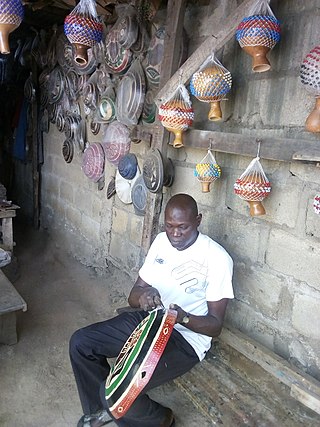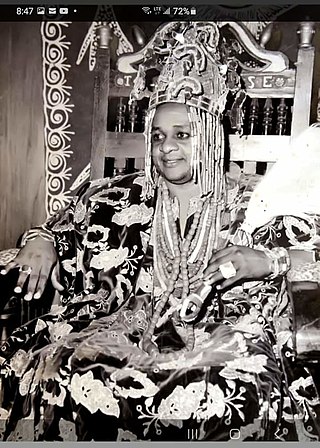Makua was an Alaafin of the Oyo Empire who died after ruling for two months in 1797. In the List of rulers of the Yoruba state of Oyo, Makua is the 32nd Alaafin of Oyo.
Makua was an Alaafin of the Oyo Empire who died after ruling for two months in 1797. In the List of rulers of the Yoruba state of Oyo, Makua is the 32nd Alaafin of Oyo.

The Oyo Empire was a powerful Yoruba empire of West Africa made up of parts of present-day eastern Benin and western Nigeria. It grew to become the largest Yoruba-speaking state and rose through the outstanding organizational and administrative skills of the Yoruba people, wealth gained from trade, and its powerful Cavalry. The Oyo Empire was one of the most politically important states in the entirety of Western Africa from the mid-17th to the late 18th century, and held sway not only over most of the other kingdoms in Yorubaland, but also over nearby African states, notably the Fon Kingdom of Dahomey in the modern Republic of Benin on its west.

Alaafin, or The Owner of the Palace in the Yoruba language, is the title of the king of the medieval Oyo empire and present-day Oyo town of West Africa. It is the particular title of the Oba (king) of the Oyo. It is sometimes translated as "emperor" in the context of ruler of empire. He ruled the old Oyo Empire which extended from the present day Benin republic to Nigeria originating from states in the South East and West to the North. The people under him are called Yoruba people and spoke the Yoruba Language.
King Abipa, also known as Ogbolu or Oba M'oro, was an Alaafin of the Oyo empire. He is believed to have ruled during the late sixteenth and early seventeenth centuries.
Ojigi was Alaafin of the Yoruba Oyo Empire from 1724-1735.
Orompoto was an Alaafin of the Yoruba Oyo Empire. The empire of which she ruled is located in what is modern day western and north-central Nigeria.
Jayin was an Alaafin of the Oyo Empire.
Aganju of Oyo was a Yoruba emperor of the Oyo state, in present-day Nigeria. He was said to have been the fourth Alaafin or old Oyo.

Oyo is an ancient city in Oyo State, Nigeria. It was founded as the capital of the remnant of the historic Oyo empire in the 1830s, and is known to its people as 'New Oyo' to distinguish it from the former capital to the north, 'Old Oyo' (Ọ̀yọ́-Ilé), which had been deserted as a result of the Yoruba Revolutionary Wars. Its inhabitants are mostly of the Yoruba people, and its ruler is the Alaafin of Oyo.
Gberu was an Alaafin of the Yoruba Oyo Empire. He was on the throne from 1730 to 1746.
The Olota of Ota is the traditional ruler and sovereign of Ota, Ogun State, Nigeria.
Makua may refer to:
Alayeluwa Oba Okunade Sijuwade, or Sijuade, was the fiftieth traditional ruler or Ooni of Ife from 1980 to his death in 2015, taking the regnal name Olubuse II. Ife is a traditional Yoruba state based in the town of Ife in Osun State, Nigeria. He was crowned on 6 December 1980 in a ceremony attended by the Emir of Kano, Oba of Benin, Amayanabo of Opobo and Olu of Warri, as well as by representatives of the Queen of the United Kingdom.
The Ilorin Emirate is a traditional state based in the city of Ilorin in Kwara State, Nigeria. It is largely populated by the Yoruba-speaking people, though the kingdom is a hybrid state due to the influence of the many other tribes that make up the city. It is one of the Banza Bakwai - or copy-cats of the legitimate Hausa Kingdoms - as a result of it being part of the Sokoto Caliphate.

Lamidi Olayiwola Adeyemi III was the Alaafin, or traditional ruler, of the Yoruba town of Oyo and rightful heir to the throne of its historic empire.
Sango Festival is an annual festival held among the Yoruba people in honour of Sango, a thunder and fire deity who was a warrior and the third king of the Oyo Empire after succeeding Ajaka his elder brother. Renamed in 2013 to World Sango Festival by the government of Oyo State, the festival is usually held in August at the palace of the Alaafin of Oyo and also observed in over forty countries around the world.
Onisile was an Alaafin of the Yoruba Oyo Empire during the eighteenth century.
The Yoruba Revolutionary Wars, otherwise known as the Yoruba Civil Wars, were a series of conflicts that engulfed the Yoruba-speaking areas of West Africa in the late 18th and early 19th centuries. Robin Law summarizes the causes of the wars as the disintegration of the old Oyo Empire after the death of Alaafin Abiodun in 1789 and a resurgence of long-standing quarrels between the provincial chiefs over various issues. The root of the first disagreements can be traced to the feud between two noble houses; Laderin, based in Ilorin, and Yamba, based in the capital at Oyo-Ile. The conflict was also exacerbated by a Muslim slave rebellion led by a Fulani Muslim cleric, Shehu Alimi, and sponsored by the Aare Ona Kakanfo, Afonja, a descendant of Laderin, the founder of Ilorin, in 1817.
The Oyo Mesi is the privy council of Oyo, a Yoruba traditional state in Southwestern Nigeria. It dates to the medieval period, when it served as the government of a powerful pre-colonial state that was known as the Oyo empire.
Adeyemi I was the last independent ruler of the Oyo Empire. He ruled from 1876 to 1905. Starting in 1888 he came under increasing British control with his independence clearly ended by 1896. He was the Alaafin during the 16 years Yoruba civil war which went on from 1877-1893.